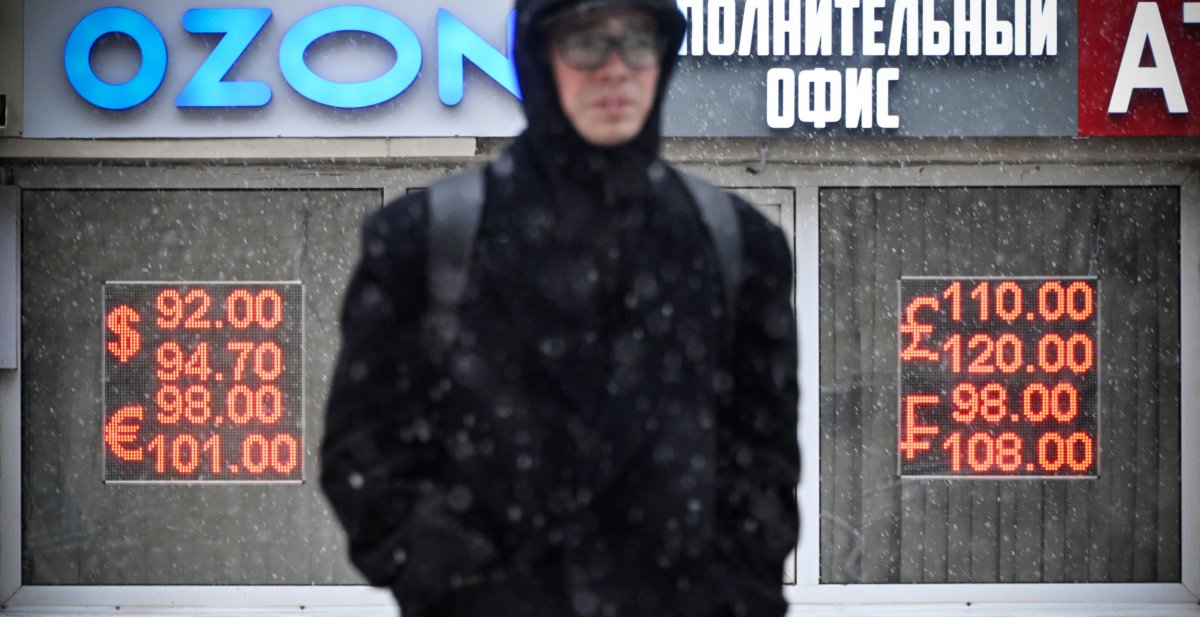Russia's export figures last year have been hit hard by tighter Western sanctions, Europe's severing of its gas purchases, and falling commodity prices.
Moscow stopped publishing detailed monthly export and import statistics soon after the start of Vladimir Putin's full-scale invasion of Ukraine spurred Western sanctions to isolate Russia's economy and choke off funds for waging war.
However, annual data released on Monday by Russia's Federal Customs Service showed a slump in the country's exports as the impact is felt of Ukraine's allies cutting their reliance on Moscow's energy products. The figures showed that, compared to 2022, Russia's export revenues for 2023 had decreased by 28.3 percent, or $167.4 billion to $425.1 billion—the lowest since the COVID-19 pandemic began in 2020.
"The oil and gas industry faces a decline in output and exports," Olga Bychkova, economist at Moody's Analytics, told Newsweek.
"The shift of oil and gas exports from Europe and the U.S. to Asia requires substantial investment, while alterations in the payment infrastructure will require longer lead times for payment receipts," Bychkova added.
"The recovery of the industries affected by sanctions is further complicated by the higher cost of imports, challenges with substituting formerly imported components with domestic goods, and the need to rebuild logistics chains."

Meanwhile, imports have increased by 11.7 percent to $285.1 billion, meaning that trade turnover in 2023 had gone down by 19.4 percent to $710.2 billion.
In breaking down the data, state news agency Tass reported that exports to European countries had plummeted in 2023 by 68 percent to $84.9 billion, while imports decreased by 12.3 percent to $78.5 billion.
However, exports to Asian countries increased by 5.6 percent to $306.6 billion and exports to African countries went up by 42.9 percent, to $21.2 billion. Meanwhile, imports increased by 11.7 percent to $285.1 billion, meaning that year-on-year trade turnover in 2023 had gone down by 19.4 percent to $710.2 billion.
U.S.-led sanctions spurred Moscow to divide the world into "friendly" and "non-friendly" countries, in which countries in the former category got steep discounts on its main commodities, such as oil and gas, which have benefited China and India.
Putin has touted closer ties with China and countries of the so-called Global South, which he tried to foster during a poorly attended summit with African leaders in St. Petersburg last July. However, it appears that this pivot away from Western economies has not been offset by new markets.
Russian gas flows from Russia to China via the Power of Siberia pipeline only "partially compensated for their decrease from Russia through pipelines to Europe", the Russian Central Bank said in a report last month. Meanwhile, tankers carrying Russian oil have been stranded off the coast of South Korea, as sanctions hurt Moscow's ability to be paid for its main export.
Two Russian economists, Alexander Knobel from the Gaidar Institute and Alexander Firanchuk, from the Center for International Trade Studies, RANEPA, said in December that relying on Beijing to make up for lost markets was risky.
This was because China may be Russia's main trading partner—providing 41 percent of imports and 26 percent of exports— but Moscow's goods account for only 5.1 percent of Chinese imports, and the Russian market only 3.3 percent of Chinese exports.
Beijing's dependence on "goods from unfriendly countries significantly exceeds its dependence on the import of Russian raw materials," meaning that, if faced with secondary sanctions, China would turn away from Russia's exports.
Chinese institutions are getting cold feet regarding trade with Moscow. Zhejiang Chouzhou Commercial Bank stopped operations in Russia following President Joe Biden's executive Order 14114, in which firms flouting sanctions could be denied access to the U.S. financial system.
IMF's Russia GDP Forecast
Last week, the International Monetary Fund (IMF) gave Russia's economy a better-than-expected bill of health, predicting that GDP would rise by 2.6 percent in 2024—more than double the 1.1 percent growth forecast that it made in October and higher than Russia's central bank's figure of between 0.5 and 1.5 percent.
The rebound of the Russian economy in the second half of 2023 was bigger than expected. This was due to more private demand and a high public expenditure as Moscow pours money into the military-industrial complex to fund its war effort in Ukraine.
Moody's Analytics has also revised upwards its forecast of Russia's GDP in 2024 from 1.7 percent in October to 2 percent this month. However, Bychkova said such economic news could be short-lived as labor market shortages hold back production, causing rising wages that are likely to be followed by price increases.
"If rising demand is not met by higher levels of output, the recent rebound in activity may prove short-lived, instead breeding higher inflation," Bychkova added.
Uncommon Knowledge
Newsweek is committed to challenging conventional wisdom and finding connections in the search for common ground.
Newsweek is committed to challenging conventional wisdom and finding connections in the search for common ground.
About the writer
Brendan Cole is a Newsweek Senior News Reporter based in London, UK. His focus is Russia and Ukraine, in particular ... Read more
To read how Newsweek uses AI as a newsroom tool, Click here.








